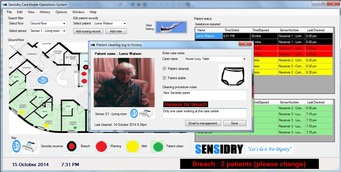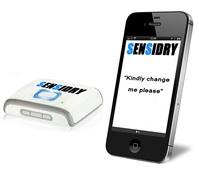Incontinence pad improves dignity by sending text message to care worker when soiled
 A team of innovators have created a ‘smart diaper’ to improve the lives of older people who suffer with incontinence, which sends a text message alert to care workers when a soiled pad needs changing.
A team of innovators have created a ‘smart diaper’ to improve the lives of older people who suffer with incontinence, which sends a text message alert to care workers when a soiled pad needs changing.
The disposable wearable technology has been designed to be used in the same way as traditional incontinence pads but has an inbuilt chip system which sends a discreet text message to care workers as soon as assistance is required.
The Sensidry ‘Smart Diaper’ aims to tackle the embarrassment and distress people living with incontinence can experience and the associated self-esteem and sense of dignity issues mainly affecting older and disabled people.
Inventor and founder of Sensidry, Avtar Chagger, first came up with the idea when caring for his two young children. He said: “When they were babies my youngest suffered from diaper rash. The area under a diaper is warm, moist, and poorly ventilated, conditions ideal for the development of a rash. It occurred to me that if the diaper sent me a signal it would make my life easier. I would not have to remember to change; I would be reminded by my mobile phone.”
 He created a prototype and shared his idea with Coventry University which carried out research suggesting the care sector would most benefit from the increase in hygiene and improved dignity the Sensidry product could offer.
He created a prototype and shared his idea with Coventry University which carried out research suggesting the care sector would most benefit from the increase in hygiene and improved dignity the Sensidry product could offer.
Mr Chagger continued: “By this time I had enlisted other project team members to help me make this a reality. We all realised that there is nothing worse for a human being, especially in mature years to be forced to lie in their own waste for periods of time, in between the changes. We all decided that application of this technology in the care sector we will implement first.”
Currently residents unable to express their needs can be left in a soiled pad for a number of hours, with many care homes operating a four hourly check system.
Research found residents left for a long time who need to be changed can cause depression, as well as medical problems such as pressure sores and unnecessary hospital admissions.
Smart Diapers will have technology built in measuring when a change is needed that sends a text message directly to care workers who can then take immediate action to improve a person’s comfort levels.
Mr Chagger said: "Incontinence can be intensely embarrassing because going to the toilet is something we learn at such a young age, and losing that control can be degrading. It is therefore difficult to accept help in this intimate area of a person’s life, particularly from someone who is close to the person."
As well as improving the quality of life for residents the smart diaper aims to reduce wastage of incontinence pads which have to be thrown away after being checked regardless of whether they have been used or not.
Care homes will be able to use an integrated system monitoring a number of residents at any one time, and Sensidry will also collect and store information to help care assistants carry out medical checks.
The team behind Sensidry hopes the product will be available next July and will soon be launching the product campaign on a crowd funding platform to raise finance for the final product development, testing and approval stages.
For more information and to register interest please visit: www.sensidry.com
Latest Innovative Care News
 13-May-19
'Pink drink' brain cancer treatment rolled out across NHS in memory of Baroness Jowell
13-May-19
'Pink drink' brain cancer treatment rolled out across NHS in memory of Baroness Jowell
 25-Apr-19
Louis Tomlinson helps 83-year-old who lost wife to dementia complete bucket list
25-Apr-19
Louis Tomlinson helps 83-year-old who lost wife to dementia complete bucket list
 22-Mar-19
UK's top care home handyman takes residents to pub for pie and pint
22-Mar-19
UK's top care home handyman takes residents to pub for pie and pint
 12-Feb-19
Michael McIntyre's jokes tested to see if they stop elderly catching flu
12-Feb-19
Michael McIntyre's jokes tested to see if they stop elderly catching flu
 07-Jan-19
'We were lucky to find it': Family's delight as care home is rated Outstanding
07-Jan-19
'We were lucky to find it': Family's delight as care home is rated Outstanding